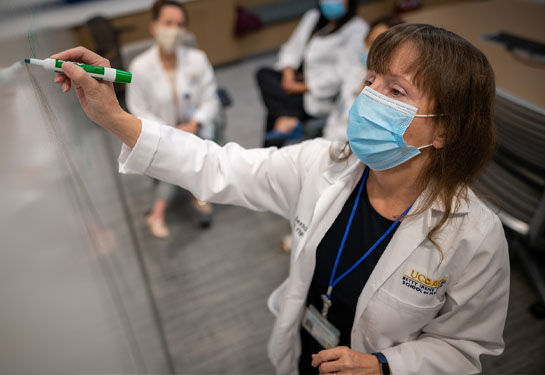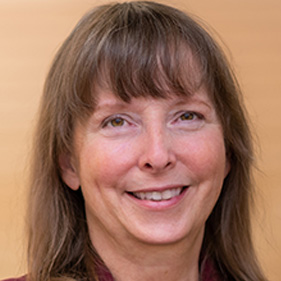Leadership woven throughout every facet of new Doctor of Nursing Practice Degree program
Leadership woven throughout every facet of new Doctor of Nursing Practice Degree program
National Nurses Week is observed each year from May 6 through May 12 to recognize the more than four million nurses in the U.S. It honors their significant contributions to improving the health and well-being of patients, families and communities. This feature illustrates how the Betty Irene Moore School of Nursing is making a difference and having an impact through our alumni, programs and education.
When you think of a leader, what comes to mind? Is it the person at the podium who commands the attention of everyone in the room? Or the quiet person in the background coaching someone else to great achievements?
At the Betty Irene Moore School of Nursing at UC Davis, faculty know leaders possess many personalities and traits. And that leadership is inherent in every individual.
“The idea that you are born into leadership is a misconception,” said Susan Adams, an associate professor and former elected county supervisor in Marin County, California. “The challenge is how do we teach people the skills to tap into their leadership potential.”
Leadership is at the core of the new Doctor of Nursing Practice — Family Nurse Practitioner (DNP-FNP) program launching this summer. Leadership that comes in many forms and presents itself differently in each and every person.
Adams says people’s approaches to leadership are as diverse as the individuals themselves. The common denominator lies in the first step of any leader — communication.
“Communication is not you telling people your thoughts or ideas. The most powerful part of communication is being a good, active listener,” Adams explained. “You must listen to understand the perspective, then be able to verbally reflect that back. Once a person is heard, you’ve established a foundation to move forward.”
In health care — whether part of a clinical team or a research team — getting to a place of agreement is critical in enacting change. At the School of Nursing, leadership skills are woven into various courses and across the entire curriculum. In fact, leadership is one of the core values upon which the school was founded more than a decade ago.
When we look at leadership, we’re really looking at how do we transform health care. —Kathryn Sexson, director of the new DNP-FNP program
Leadership that transforms health care
Students in their first year of the Doctor of Nursing Practice — Family Nurse Practitioner (DNP-FNP) program learn about quality improvement and safety, organizational and system change and leadership in foundational coursework. In the second year, they apply those skills in clinical experiences.
“When we look at leadership, we’re really looking at how do we transform health care,” said Kathryn Sexson, director of the DNP-FNP program. “We’re not just giving you the theoretical frame, but we’re giving you the skills to operationalize it in practice.”
The three-year hybrid program prepares advanced practice providers to engage in patient- and family-centered, evidence-based primary care. Also woven throughout the curriculum are innovative clinical practices and health equity.
“We look at health disparities and social determinants and examine health equity from historical and societal perspectives,” Sexson added. “We then educate our students so that they actually have a framework of cultural humility to start to break down barriers that contribute to inequities for marginalized and underserved populations.”
School of Nursing students demonstrate a history of leading in areas of need. Whether its wildfires or COVID-19 vaccination efforts, they actively engage in making their communities a better place. Their educational experiences — both in the classroom and out, in person or virtually, in small groups or individual study — forever change how they view themselves as leaders and how they lead in the world.
“Leadership is for everyone, and everyone can be a leader,” Adams said. “At the Betty Irene Moore School of Nursing, we’re giving you the opportunity to learn the skills that will get you there.”





